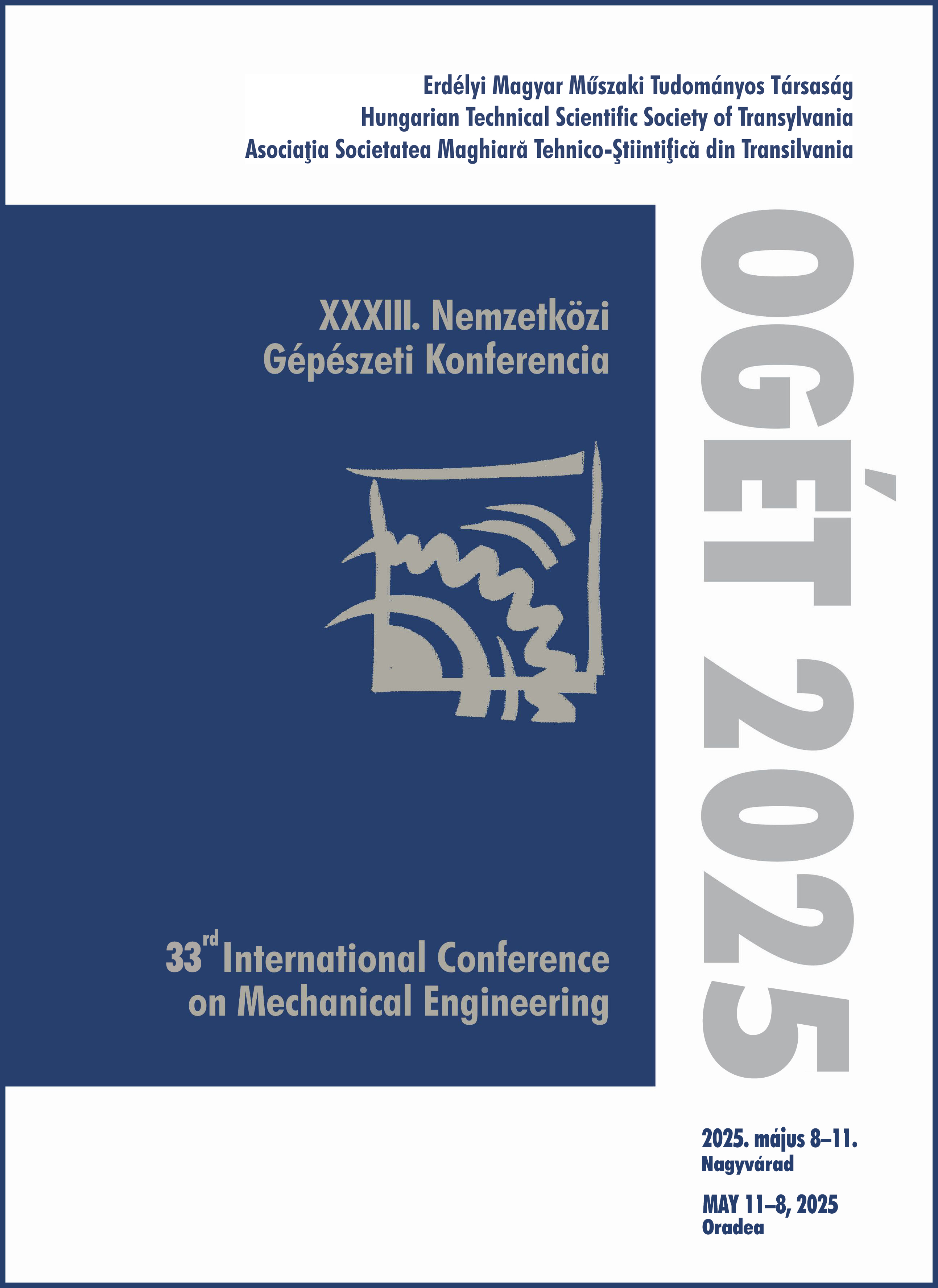Alacsony Hőmérsékletű Égésfolyamatok Mesterséges Intelligencia Alapú Analízise
AI-based Analysis of Low Temperature Combustion
Keywords:
Artificial Intelligence, Low temperature combustion, Model predictive control, AI prediction, Modulated kinetics, /, Mesterséges intelligencia, Alacsony hőmérsékletű égésfolyamat, Model prediktív vezérlés, AI predikció, Modulált kinetikaAbstract
Heavy-duty vehicles and other commercial vehicles require high energy-density onboard energy storage provided by internal combustion engines, along with cost efficiency. Therefore, their environmental impact must be further reduced in the future. Low temperature combustion (LTC) offer an excellent solution, as it can simultaneously reduce nitrogen oxide and soot emissions in compression ignition engines while improving efficiency. However, controlling such unstable combustion processes is challenging, making the use of model predictive controllers (MPC) essential for market applications, as they can regulate combustion on a cycle-to-cycle basis. Instead of traditional physical models, artificial intelligence (AI) based models can be more effective due to their simplicity, making them a viable option for MPC development. This paper presents AI-based models capable of predicting the key parameters of the combustion process during both conventional diesel and LTC operation. The applied LTC process is modulated kinetics (MK), that utilizes high levels of exhaust gas recirculation (EGR). The models were trained and validated using 113 different inlet oxygen concentrations to accurately model the effects of EGR. The results show that the models are accurate, making it possible to implement an MPC using them in future research.
Kivonat
A nehézgépjárművek és a szállítmányozás egyéb haszonjárművei megkövetelik a belsőégésű motorok által nyújtott nagy energiasűrűségű fedélzeti energiatárolást és a költséghatékonyságot, így ezek környezetterhelését a jövőben tovább kell csökkenteni. Erre az alacsony hőmérsékletű égésfolyamatok (LTC) kitűnő megoldást nyújtanak, hiszen alkalmazásukkal egyidejűleg csökkenthető a kompressziógyújtású motorok nitrogén-oxid és korom emissziója, valamint a hatásfok is növelhető. Ugyanakkor az ilyen instabil égésfolyamatok irányítása nehéz, emiatt a piaci alkalmazások esetén elengedhetetlen a modell prediktív vezérlők (MPC) használata, melyek ciklusról ciklusra irányíthatják az égésfolyamatot. A hagyományos fizikai modellek helyett a mesterséges intelligencia (AI) alapú modellek hatékonyabbak lehetnek egyszerűségük miatt, ezért az MPC készítése során is érdemes lehet erre támaszkodni. Ebben a cikkben mesterséges intelligencia alapú modellek kerülnek bemutatásra, melyek képesek az égésfolyamat legfontosabb paramétereit előrejelezni normál dízel illetve LTC üzem során. A létrehozott LTC folyamat modulált kinetika (MK) típusú, mely nagyarányú kipufogógáz visszavezetést (EGR) alkalmaz. A modellek így 113 különböző szívóoldali oxigénkoncentráció mellett lettek betanítva és validálva, hogy az EGR hatása megfelelően modellezésre kerüljön. Az eredmények azt mutatják, hogy a modellek pontosak, így a jövőbeni kutatások során ezek felhasználásával lehetséges egy MPC implementálása.
References
European Commission: Directorate-General for Research and Innovation, European Green Deal – Research & innovation call, Publications Office of the European Union, 2021, https://data.europa.eu/doi/10.2777/33415
EEA. Annual European Union Greenhouse Gas Inventory 1990–2015 and Inventory Report 2017; European Environment Agency, 2017. Available online: https://www.eea.europa.eu/publications/european-union-greenhouse-gas-inventory-2017 (accessed on 14 February 2025).
Rizopoulos D., Esztergár-Kiss D. (2024) A modal share scenario evaluation framework including electric vehicles, Research in Transportation Business & Management, Vol. 56, paper 101201, DOI: 10.1016/j.rtbm.2024.101201
Kocsis Szürke, S., Kovács, G., Sysyn, M., Liu, J., & Fischer, S. (2023). Numerical Optimization of Battery Heat Management of Electric Vehicles. Journal of Applied and Computational Mechanics, 9(4), 1076-1092. https://doi.org/10.22055/jacm.2023.43703.4119.
Zöldy M. (2007). Bioethanol-biodiesel-diesel oil blends effect on cetane number and viscosity, 6th International Colloquium Fuels 2007, Technische Akademie Esslingen.
Emőd, I., Füle, M., Tánczos, K., & Zöldy, M. (2005). A bioetanol magyarországi bevezetésének műszaki, gazdasági és környezetvédelmi feltételei. Magyar tudomány, 50, 278-286.
Agarwal, A. K., Singh, A. P., Maurya, R. K. (2017). Evolution, challenges and path forward for low temperature combustion engines. Progress in Energy and Combustion Science. 61, 1–56. DOI: https://doi.org/m5vx
Krishnamoorthi, M., Malayalamurthi, R., He, Z., Kandasamy, S. (2019). A review on low temperature combustion engines: Performance, combustion and emission characteristics. Renewable and Sustainable Energy Reviews. 116, 109404. DOI: https://doi.org/m5v2
Singh, A. P., Agarwal, A. K. (2018). Low-Temperature Combustion: An Advanced Technology for Internal Combustion Engines. In: Srivastava, D., Agarwal, A., Datta, A., Maurya, R. (eds): Advances in Internal Combustion Engine Research. Energy, Environment, and Sustainability. Springer, Singapore. 9–41. DOI: https://doi.org/gjjp9t
Lee, Y., Huh, K. Y. (2014) Analysis of different modes of low temperature combustion by ultra-high EGR and modulated kinetics in a heavy duty diesel engine. Applied Thermal Engineering. 70(1), 776–787. DOI: https://doi.org/f6gnm2
Li, Y.; Liu, L. Physics-Informed Neural Network-Based Nonlinear Model Predictive Control for Automated Guided Vehicle Trajectory Tracking. World Electr. Veh. J. 2024, 15, 460. https://doi.org/10.3390/wevj15100460
Sadaf Batool, Jeffrey D. Naber, Mahdi Shahbakhti “Machine learning approaches for identification of heat release shapes in a low temperature combustion engine for control applications”, Control Engineering Practice, Volume 144, 2024, 105838, https://doi.org/10.1016/j.conengprac.2023.105838.
Bao, Y, Mohammadpour Velni, J, & Shahbakhti, M. "An Online Transfer Learning Approach for Identification and Predictive Control Design With Application to RCCI Engines." Proceedings of the ASME 2020 Dynamic Systems and Control Conference. Volume 1, Online. October 5–7, 2020, ASME, https://doi.org/10.1115/DSCC2020-3210.
Adam Vaughan, Stanislav V. Bohac “Real-time, adaptive machine learning for non-stationary, near chaotic gasoline engine combustion time series”, Neural Networks, Volume 70, 2015, pp. 18-26, https://doi.org/10.1016/j.neunet.2015.04.007.
Virt, M., Zöldy, M. "Cost Efficient Training Method for Artificial Neural Networks based on Engine Measurements", Acta Polytech-nica Hungarica, 21(7), pp 123–145, 2024. https://doi.org/10.12700/APH.21.7.2024.7.8
Virt, M., Zöldy, M. (2024). Realization of Low Temperature Combustion in an Unmodified Diesel Engine. Cognitive Sustainability, 3(2). https://doi.org/10.55343/cogsust.104


